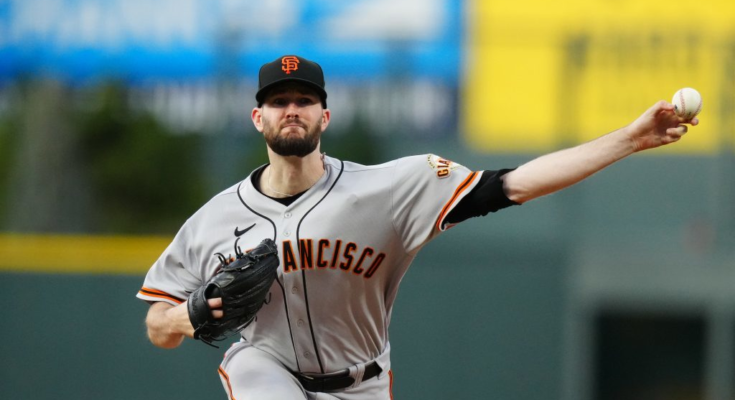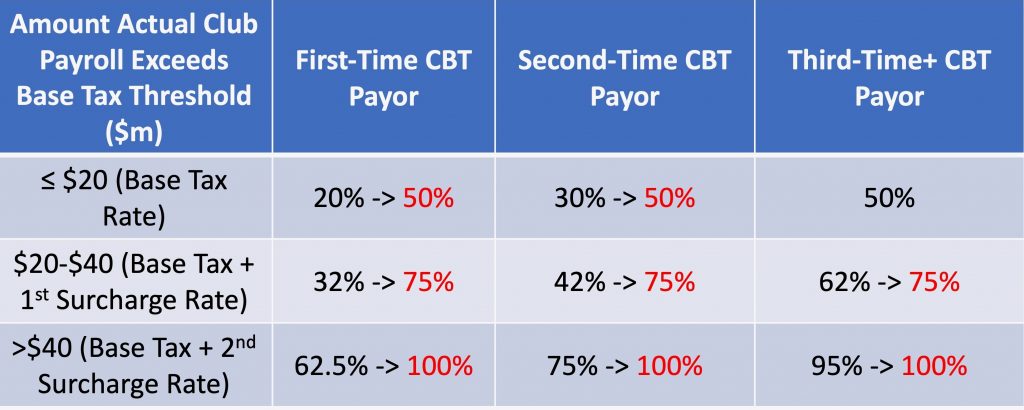In a recent article, I tried to make the point that MLB, in general, wants something resembling the status quo in these CBA negotiations. But there’s one area where I was wrong and MLB’s proposals have been clearly worse than the status quo, and that’s the competitive balance tax.
Let’s look at how MLB’s proposed tax rates compare to the status quo from 2017-21.
MLB’s goal here is clear: make teams much less likely to exceed the base tax threshold at all. However “soft” of a salary cap this was in the 2017-21, MLB is attempting to harden it. These tax rates say, “If you go over the tax thresholds, we’re really going to make you pay.”
MLB doubled down on the goal of hardening the CBT as a cap by adding new draft pick penalties. The status quo: any club that exceeds the second surcharge threshold ($250MM in 2021) would have its highest available selection in the next draft moved back ten spots. If a team is set to pick in the top six, that is left alone and the second-rounder is moved back ten spots.
MLB’s latest offer is far more extreme than this: a team in the second tier (MLB proposes $234-254MM for 2022) entirely surrenders its second round pick, and a team in the third tier ($254MM+) forfeits its first round pick.
I don’t think anyone would argue with this: MLB’s current proposal is for a much more restrictive competitive balance tax, without even getting into the matter of the thresholds. So, how would they defend it? The answer is that MLB likely feels it’s proposing an even trade by eliminating draft pick compensation for signing free agents.
Every winter, somewhere between six and 20 players at the top of the free agency class receive a qualifying offer. Under this system, the worst possible penalty for signing a qualified free agent is forfeiture of a second and fifth round pick and having your international bonus pool reduced by $1MM. The Yankees, for example, made this sacrifice to sign Gerrit Cole. MLB’s pitch may be that under their new CBT plan, teams would have forfeited fewer draft picks than they gave up to sign free agents during the most recent CBA (something I intend to explore). I think that in MLB’s eyes, they are offering to transfer the burden that a certain number of players at the top of each free agent market bear under the qualifying offer system to the team level as a CBT penalty.
Elimination of the qualifying offer system would remove the Craig Kimbrel/Dallas Keuchel type situations, where those players waited until after the June draft to sign because of the drag caused by draft pick compensation. It would also remove the dynamic where a player accepts a qualifying offer and ultimately earns less in his career as a result, like perhaps Neil Walker.
I would guess that the MLBPA doesn’t consider this an even trade whatsoever, and has likely told MLB as much. The MLBPA likely takes major issue with drastically increased CBT penalties. Consider Giants pitcher Alex Wood, who tweeted,”If penalties increase under the CBT/Luxury tax IT DOES NOT MATTER WHAT THE THRESHOLD IS MY GOD. Make the threshold a billion dollars it doesn’t matter. Teams already don’t spend bc they use the current penalties as an excuse not to. Imagine if the penalties got worse. SMH.”
In a theoretical sense, I disagree with Alex. One could argue that the thresholds matter more than the penalties, because more teams stop right before the base tax threshold than actually pay the tax. In recent years, only two or three teams have typically paid the tax. To take Alex’s example to the extreme, if the base tax threshold actually was a billion dollars, and the penalty for exceeding it was that the team needed to play defense with only eight players on the field at all times, the MLBPA should take that deal because the penalty is irrelevant if teams don’t exceed the base tax threshold.
However, there’s a slippery slope concern here on the side of the MLBPA. History has shown us that once the players surrender something to MLB, it is very hard to claw any of it back. Case in point, the players moved arbitration eligibility from three years to two in 1980 and gave that back in 1985. Since then they’ve only managed to win back 22% of the 2+ class, and MLB is currently drawing a hard line on a return to the pre-1985 arbitration structure.
That’s why the MLBPA will likely draw their own hard line and refuse to further increase the tax rates or the draft pick penalty for exceeding tax thresholds. That might be one of the MLBPA’s non-starter stances. And if the MLBPA thinks elimination of the qualifying offer system is of modest value, keeping it in place would not be a major problem.
MLB should stop proposing this supposedly even trade. It’s like in a fantasy baseball league where a guy keeps making you the same offer over and offer, telling you it’s fair. It’s just not conducive to making a larger deal.
MLB should take increased CBT penalties off the table entirely, and should also propose leaving the qualifying offer system completely intact from the previous CBA. That would be, literally, the status quo. Then, with the clock ticking, the two sides can get down to solving the $51MM gulf between where they think the CBT thresholds should land by 2026.



